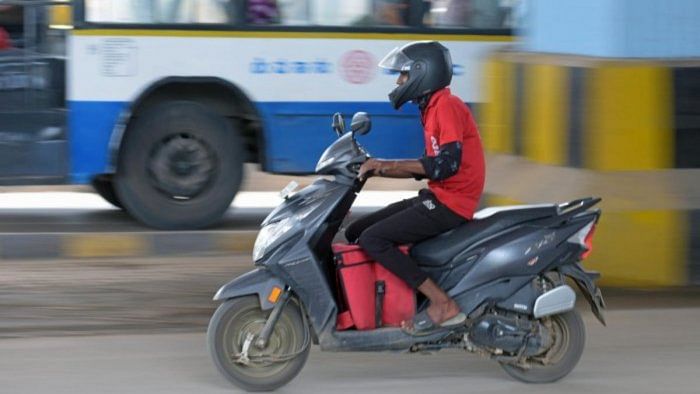
The government’s quick reaction to complaints of overpricing by Ola and Uber autos comes in stark contrast to its silence on the exploitation of workers who have built the city’s gig economy.
Adding to its industry-friendly laws, Karnataka notified its startup policy in November 2015, promising incubation, hand holding and tax cuts for entrepreneurs. IT and ITes companies were exempted from labour laws.
The state is home to over 40 of the 107 unicorns in the country, several of whom depend on the hard labour of gig workers.
Over the last 10 years, the workers have protested frequently against the denial of minimum wages, but the government has done little to help them.
Overtime pay and social security, both essential labour rights, have not even come up for consideration. Rights groups have repeatedly flagged the need for a law to protect such workers.
In 2015, workers ransacked the offices of Uber in Bengaluru when their earnings fell drastically. Ola, too, faced protests.
The discontent culminated in the January 2017 strike when thousands of drivers logged off the platforms for nearly a week.
“Only when commuters complained about non-availability of cabs did the government take note, but the problems of drivers were completely ignored even then,” said Tanveer Pasha, leader of Ola, Taxi for Sure, Uber Taxi Owners and Drivers Association.
The denial starts with the contract describing gig workers as ‘partners’.
“The contractual agreements are often drafted in a manner to prevent the workers from going to court. The entire narrative of the platform economy is to emphasise the ‘personal responsibility’ of the gig worker,” notes the December 2021 report by the People’s Union of Democratic Rights (PUDR), which looked into the service terms of Uber and TaskRabbit, a platform which aggregates labourers.
Sampath C, general secretary of Adarsh Autorickshaw Drivers’ Union, said the companies disrupt the market by offering incentives in the initial days.
“Just like taxi drivers, auto drivers lined up in front of cab aggregators to sign agreements due to the promise of incentives. Today, they see half their earnings being taken away by the companies,” he said.
Pasha said the drivers were ‘lured’. But at present, they were not demanding the same incentives they received in the early days.
“What we are asking is for rightful fare, not a share in the companies’ profits. At present, 40% to 60% of the fare paid by a passenger goes to the companies as convenience or access charge. On top of this, companies deduct a platform usage charge as well as 25% commission on each ride. Drivers are dependent on the apps for ride bookings, but is this the price we have to pay?” he asked.
The PUDR report noted that the “structure of commissions can be designed to keep the workers locked in for long periods of time”.
“I’m forced to work 14 to 16 hours a day to ensure that I will have about Rs 1,000 to take home. This was not the case earlier,” said Purushotham, a taxi driver.
Fairwork India, which rates service delivery platforms on a scale of 0 to 10 points on the basis of the companies’ performance in protecting labour rights, has put Ola, Porter and Uber at the bottom with a score of 0 for the year 2021.
The best performer Flipkart, scored 7 and was followed by Urban Company (5). Amazon, Dunzo and Pharmeasy scored 1 point each. The scores of Zomato (3), Swiggy (4) and Bigbasket (4) were also low.
The scores took into account, among other things, the company’s approach to wages, risk mitigation and safety.
A study of Bengaluru’s food delivery workers published by the National Law School of India University (NLSIU) said the situation of gig workers during the pandemic “exposes the myth perpetuated by the industry that these workers are independent contractors”.
The “unequal relationship,” where the company thrives on the dependency of the gig worker and sets unrealistic deadlines, exposes the workers to accident risks. This makes it evident that the workers are anything but “partners”.
“Workers can log off and go home in theory. (But) the target and incentive model with their many conditionalities together with steadily deteriorating per-order rates and incentives ensure that workers are bound to a platform and remain logged-in for long hours,” it noted.
While the occupation also brings fatigue from long hours of work and exposure to pollution and climate variations, the companies provide no social security.
The study stressed the need to cover such workers under labour laws to ensure just and humane conditions.
Govt abandons gig workers
In February 2020, the government said it had asked NLSIU to work on a law for gig economy workers.
Sources in the labour department said there was no progress in the matter.
Professor Babu Mathew from the Centre for Labour Studies at NLSIU said the social security code enacted by the union government, which extends PF, ESI, gratuity, maternity and employee compensation to the organised sector, doesn’t have much to offer to the gig economy workers.
“Even then, the code deals with social security in a truncated manner. As far as the gig platform workers are concerned, whatever the Centre has written into the social security law has been done in the best interest of the companies, not the workers,” he said.
Prof Mathew added that the code was an eyewash which strengthened the existing status quo by denying the gig workers their right to enjoy the employee relation with the platforms. He also red-flagged the amendment to the labour codes.
“We are pushing 93% of the work force or more than 47 crore people into a corner. It’s a shortsighted policy. It will become counterproductive and boomerang. They are going against the entire logic of 100 years of labour reforms,” he said.